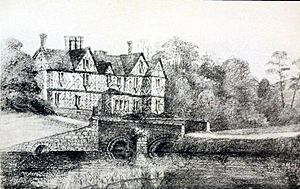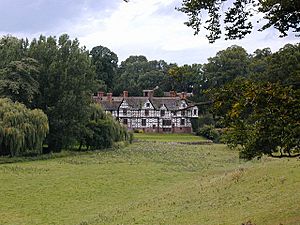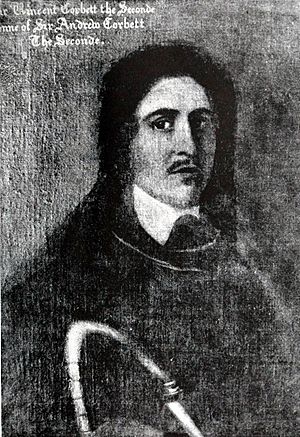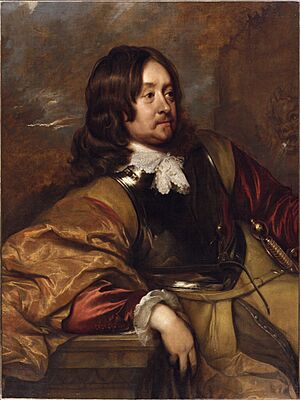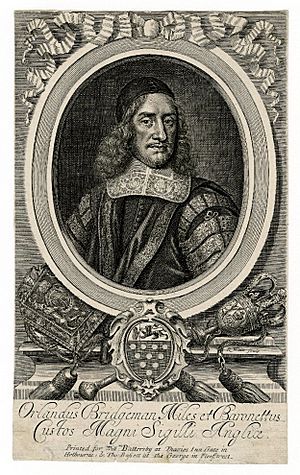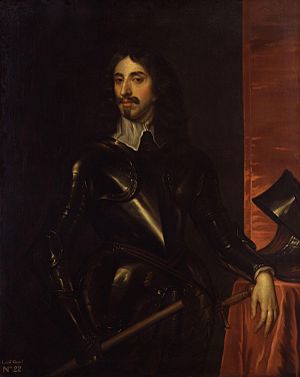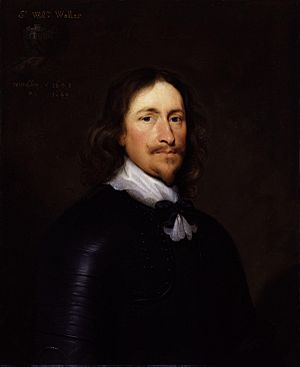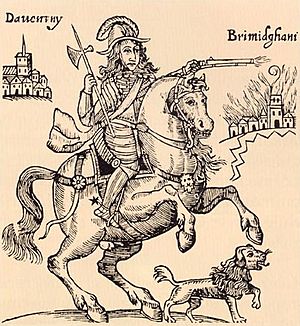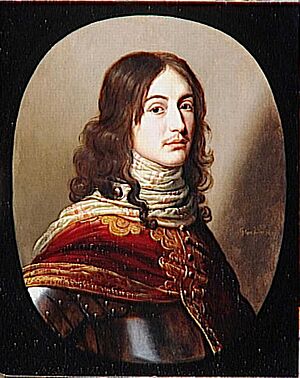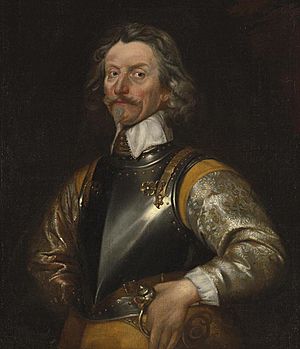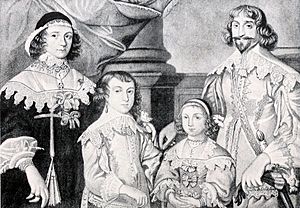Francis Ottley facts for kids
Quick facts for kids
Francis Ottley
|
|
|---|---|

Francis Ottley, from a family portrait of about 1636, now in Shrewsbury Museum and Art Gallery
|
|
| Military governor of Shrewsbury | |
| Assumed office February 1643 |
|
| Monarch | Charles I |
| High Sheriff of Shropshire (Royalist) | |
| In office 1644–1646 Serving with Thomas Mytton (Parliamentarian)
|
|
| Personal details | |
| Born | circa 1600 Pitchford Hall, Shropshire |
| Died | 11 September 1649 London |
| Spouse | Lucy Edwards |
| Children | 3, including Richard |
| Relatives |
|
| Profession | Politician, soldier |
| Signature | |
Sir Francis Ottley (born around 1600 or 1601, died September 11, 1649) was an English politician and soldier. He was a supporter of the King (a Royalist) during the English Civil War. He played a big part in the war in Shropshire, a county in England.
Francis Ottley was the military governor of Shrewsbury in the early years of the war. Later, he became the Royalist High Sheriff for Shropshire. He also helped to arrange the surrender of Bridgnorth. His last years were spent trying to get his family's lands back after they were taken by the other side.
Contents
Early Life and Family History
Francis Ottley's parents were Thomas Ottley and Mary Gifford. The Ottley family were part of the landed gentry. This means they were wealthy landowners, but not nobles.
They made their money as merchants in Shrewsbury. Shrewsbury was rich because it had a special right to finish Welsh cloth. In 1473, an earlier Thomas Ottley bought Pitchford Hall. This helped the family become important landowners.
Francis's mother, Mary Gifford, was the daughter of Roger Gifford. He was a famous doctor who worked for Queen Elizabeth I.
Francis went to Shrewsbury School when he was ten. Later, he studied at Lincoln College, Oxford, and then trained to be a lawyer. In 1621, he married Lucy Edwards. She was the daughter of Thomas Edwards, who was the High Sheriff of Shropshire at the time.
Shrewsbury and the Civil War
Francis Ottley was already active in local politics before the English Civil War began in 1642. He quickly became a leader for the King's side (the Royalists) in Shropshire. He helped King Charles I take control of the county.
At this time, there were no newspapers in the Midlands. So, Ottley had someone in London send him news. This helped him stay updated on what was happening in the country.
The town of Shrewsbury was divided. Some people supported the King, and others supported Parliament. In the summer of 1642, both sides tried to gather their forces. Ottley received an order from the King to gather the county's local soldiers.
On August 1, Ottley stopped Parliament's attempt to gather soldiers. The next day, Royalist soldiers trained under Sir Vincent Corbet, 1st Baronet. On August 8, people in Shrewsbury signed a statement of loyalty to the King. Ottley was one of the signers.
The King raised his flag at Nottingham on August 22. This was like declaring war on Parliament. Ottley worked to bring the King to Shrewsbury. On September 10, the King wrote to Ottley, allowing him to raise 200 soldiers to take Shrewsbury.
On September 15, Shrewsbury's council agreed to let the King enter the town. On September 20, the King and his army arrived in Shrewsbury. The townspeople welcomed them, though they had little choice. The King knighted Francis Ottley on September 21, 1642.
The King stayed in Shrewsbury until October 12, 1642. Royalist soldiers in the town were not paid well. They started to demand money and loot from people. Ottley received complaints from people whose homes were looted. Even though he wasn't officially the governor yet, people looked to him for help.
Becoming Governor
When the King left Shrewsbury on October 12, Ottley was still not officially the military governor. He had a document from the King that told him to stay in the county and protect his family. So, he kept trying to get the official job of governor.
In December, Ottley and other gentry helped pay for a small group of cavalry soldiers. In January 1643, Ottley pushed again to be made governor. He sent valuable weapons to Oxford, where the King's government was based. This helped him gain the King's favor.
On February 9, a letter from Edward Hyde (a key Royalist advisor) mentioned Ottley's official appointment. This meant Ottley had finally become the governor of Shrewsbury.
Challenges as Governor
The war made life hard in Shrewsbury. Trade was difficult, and Royalist soldiers often caused problems. Ottley received many complaints. For example, a wine merchant from Bristol asked what happened to his wine that Ottley's soldiers had taken.
Ottley's position was getting harder. He received news from his friend Orlando Bridgeman about events in Cheshire and north Shropshire. The news was often bad, and Bridgeman usually asked for more men and supplies.
In January 1643, Ottley received urgent letters about Parliament's forces, led by Sir William Brereton. One letter asked for many surgeons for wounded soldiers.
In February, Parliament created a committee for Shropshire to take control of the county. This made things even more difficult for Ottley. People complained about high taxes and soldiers taking their goods.
Parliamentarian lands in Royalist areas were sequestered, meaning they were taken over. This caused problems for Ottley, especially with his cousin Humphrey Mackworth's lands. Mackworth's mother, Ottley's aunt, asked him not to let her suffer because of her son's actions.
Ottley took strong actions against people who were disloyal. He ordered the arrest of George Baxter, a Puritan minister. At the Spring court sessions in 1643, many people were charged with disloyalty. Most had spoken against the King. On March 17, Ottley ordered the arrest of 43 people for not supporting the King.
Royalist Changes and Retreat
The Royalists felt very threatened. On March 17, Sir Vincent Corbet asked for more soldiers after a defeat. Two days later, William Blunden, Ottley's cousin, wrote that his troops had no gunpowder.
The Royalist government realized they needed better organization. On April 1, they appointed Lord Capel as the regional commander. Capel wrote to Ottley to arrange for gunpowder storage in Shrewsbury. Ottley was put in charge of the town's weapons storage.
Capel began to demand money and supplies from Ottley. He wanted Ottley to make sure people paid what they promised to support the soldiers. He also ordered a survey of the town's resources to see what could be taken. The King himself wrote, asking for flax and hemp to make matches for muskets.
The new military measures did not calm Royalist fears. Parliament used propaganda to keep their opponents worried. On May 6, William Waller, a Parliamentarian commander, demanded that clergy in Shropshire take an oath to Parliament. He suggested he would join Brereton's forces.
On May 16, Sir Richard Leveson asked Ottley to help move his household goods into Shrewsbury for safety. Capel ordered Ottley to improve Shrewsbury's defenses so it could withstand a siege for at least six months. Capel seemed to respect Ottley's efficiency.
Capel continued to prepare the region for war. On June 13, he demanded two horses from each gentry family. Soldiers from Shrewsbury's garrison were taking weapons and threatening people. An apprentice was forced into the army, hurting his master's business.
By late June, Capel was worried about the movements of Sir John Corbet, a Parliamentarian leader. There were rumors of plots among the townspeople of Shrewsbury. A letter warned Ottley that there were plans to replace him as governor.
Around August, the Parliamentarian committee, with Brereton's help, took control of the town of Wem. The Royalists had to spend a lot of money rearming their forces. In October, the Parliamentarians at Wem, though only 300 strong, fought off an attack by 5000 of Capel's troops. The townspeople, including many women, helped them.
Soon after this failure, a plot against Royalist control was found in Shrewsbury. The town's records show money was spent on building gallows in December, suggesting many executions. But this was not enough for Ottley's Royalist critics.
Losing the Governorship
Prince Rupert was made Captain-General of Forces in the region on January 6, 1644. He had heard bad things about the situation in Shropshire from Sir John Mennes. Rupert wrote on January 25, 1644, demanding that Ottley be very strict. He also announced that he would soon make Shrewsbury his base. Ottley replied that he had already hanged a soldier for not doing his duty.
Mennes continued to speak against Ottley. The fighting in the region increased quickly. Parliamentarian forces continued to cause problems for the Royalists. On February 14, the King asked for a loan of £100,000. Ottley's contribution was set at only £30, likely because he had already given a lot to the Royalist cause.
Rupert arrived in Shrewsbury on February 18. The biggest problem for the Royalists was a lack of money. Rupert stopped soldiers from staying in civilian homes for free. He also made an agreement to pay officers and officials, with Ottley to receive £20 a week. However, this was hard to do because the area had already been stripped of resources.
Rupert led a harsh campaign against Parliamentarian troops. In March, he left to help Newark. Ottley visited Oxford, likely to get support from the King. When he returned, the mayor and aldermen welcomed him. Ottley stayed in office for some time, but Rupert was not impressed with him. It was probably in July that Rupert finally removed Ottley from his position. Sir Fulke Hunckes, a veteran soldier, took over as governor.
Ottley remained a Royalist soldier in Shrewsbury. Later that year, Rupert returned to Shropshire and replaced Hunckes with Sir Michael Erneley. Ottley became one of the Commissioners of Shropshire, working with Prince Rupert. They decided to pay Ottley's unpaid wages from the lands of a Parliamentarian noble. By December 23, he was also the Royalist High Sheriff of Shropshire.
Prince Maurice, Rupert's brother, was put in charge of the Royalist forces in the region. He was also very demanding. Sir Robert Howard suggested that the county's gentry pay £100 a month to gain Maurice's favor. Ottley hoped for a fairer system to pay for the war.
Maurice soon complained about the lack of money for fortifications at Bridgnorth. In Shrewsbury, Erneley was trying to strengthen the town's defenses, expecting an attack. On February 1, Ottley asked for 300 infantry soldiers for him to command. He also planned to lead a group of cavalry.
Capture and Aftermath
On February 4, Prince Maurice arrived in Shrewsbury. He weakened the town's defenses by taking some soldiers to reinforce his army in Wales and Cheshire. This gave the Parliamentarian committee a chance to attack.
On February 21, Parliamentarian forces pledged £2000 for the operation. They also said that looting in Shrewsbury would lead to execution. Later that day, they surprised a meeting of Royalist commissioners at Apley Hall. They captured Ottley and others. The next evening, a small Parliamentarian force entered the town. Shrewsbury fell to the Parliamentarians with little fighting.
Ottley was released within a few months. On July 24, Prince Maurice sent a letter saying that Ottley had special permission from the King to gather forces. This was a last effort as Royalist resistance was crumbling. Ottley was appointed a commissioner to help achieve a good peace deal.
Military leadership fell to Lord Astley. Ottley wrote to him about growing disagreements and low morale among the remaining Royalist forces. On January 10, 1646, Astley replied, saying Bridgnorth was a big concern. The Royalist forces collapsed. Astley's army was defeated on March 21. On April 26, Bridgnorth surrendered. Ottley was one of the people who negotiated the surrender of this last Royalist stronghold in Shropshire. He got relatively good terms for himself. His wife and children were allowed to live at Pitchford.
Dealing with Sequestration
After the surrender, Ottley and his family had to choose between peace or leaving the country. He chose to stay. On April 28, he received a pass to return to Pitchford with his family and belongings. Since his estates had been sequestered (taken by the Parliamentarian government), he had to pay a fine to get them back. This process was called compounding for delinquency.
Lady Ottley worked to secure their property. On September 5, 1646, she and the children were given a fifth of Sir Francis's estates for their living expenses.
On June 16, Ottley formally asked to compound for his delinquency. Two days later, he asked the County Committee to return his father's will and other documents. There was some disagreement between the sequestrators (who managed the seized lands) and the County Committee. The Committee was taking timber from Ottley's land as payment for houses he had burned during the war.
The process of getting his lands back was very long and complicated, taking over three years. On September 7, 1646, Ottley's fine was set at £2,130. He asked for the value of the timber taken by the County Committee to be subtracted from his fine. On April 13, 1649, Sir Francis asked for his son Richard to be included in his composition. The next day, his fine was lowered to £1860. After more talks about his debts, the fine was reduced again by £660. Finally, on June 25, 1649, he was ordered to pay a fine of £1200.
Death
Francis Ottley died in London on September 11, 1649.
Marriage and Children
Francis Ottley married Lucy Edwards in 1624. She was a widow and about eight years older than him. Francis and Lucy Ottley had at least three children:
- Sir Richard Ottley (born September 15, 1626) became an important politician in Shropshire after the King returned to power.
- Adam Ottley (born October 26, 1628) was also involved in politics and became the town clerk of Shrewsbury.
- Mary Ottley (born March 30, 1630) lived through the Civil War but died in August 1648.
Lady Lucy Ottley lived much longer than her husband and two of her children. She was buried on May 19, 1680, at Pitchford.
Family Tree
| Family tree: the Ottleys of Pitchford | |||||||||||||||||||||||||||||||||||||||||||||||||||||||||||||||||||||||||||||||||||||||||||||||||||||||||||||||||||||||||||||||||||||||||||||||||||||||||||||||||||||||||||||||||||||||||||||||||||||||||||||||||||||||||||||||||||||||||||||||||||||||||||||||||||||||||||||||||||||||||||||||||||||||||||||||||||||||||||||||||||||||||||||||||||||||||||||||||||||||||||||||||||||||||||||||||||||||||||||||||||||||||||||||||||||||||||||||||||||||||||||||||||||||||||||||||||||||||||||||||||||||||||||||||||||||||||||||||||||||||||||||||||||||||||||||||||||||||||||||||||||||||||||||||||||||||||||||||||||||||||||||||||||||||||||||||||||||||||||||||||||||||||||||||||||||||||||||||||||||||||||||||||||||||||||||||||||||||||||||||||||||||||||||||||||||||||||||||||||||||||||||||||||||||||||||||||||||||||||||||||||||||||||||||||||||||||||||||||||||||||||||||||||||||||||||||||||||||||||||||||||||||||||||||||||||||||||||||||||||||||||||||||||||||||||||||||||||||||||||||||||||||||||||||||||||||||||||||||||||
|---|---|---|---|---|---|---|---|---|---|---|---|---|---|---|---|---|---|---|---|---|---|---|---|---|---|---|---|---|---|---|---|---|---|---|---|---|---|---|---|---|---|---|---|---|---|---|---|---|---|---|---|---|---|---|---|---|---|---|---|---|---|---|---|---|---|---|---|---|---|---|---|---|---|---|---|---|---|---|---|---|---|---|---|---|---|---|---|---|---|---|---|---|---|---|---|---|---|---|---|---|---|---|---|---|---|---|---|---|---|---|---|---|---|---|---|---|---|---|---|---|---|---|---|---|---|---|---|---|---|---|---|---|---|---|---|---|---|---|---|---|---|---|---|---|---|---|---|---|---|---|---|---|---|---|---|---|---|---|---|---|---|---|---|---|---|---|---|---|---|---|---|---|---|---|---|---|---|---|---|---|---|---|---|---|---|---|---|---|---|---|---|---|---|---|---|---|---|---|---|---|---|---|---|---|---|---|---|---|---|---|---|---|---|---|---|---|---|---|---|---|---|---|---|---|---|---|---|---|---|---|---|---|---|---|---|---|---|---|---|---|---|---|---|---|---|---|---|---|---|---|---|---|---|---|---|---|---|---|---|---|---|---|---|---|---|---|---|---|---|---|---|---|---|---|---|---|---|---|---|---|---|---|---|---|---|---|---|---|---|---|---|---|---|---|---|---|---|---|---|---|---|---|---|---|---|---|---|---|---|---|---|---|---|---|---|---|---|---|---|---|---|---|---|---|---|---|---|---|---|---|---|---|---|---|---|---|---|---|---|---|---|---|---|---|---|---|---|---|---|---|---|---|---|---|---|---|---|---|---|---|---|---|---|---|---|---|---|---|---|---|---|---|---|---|---|---|---|---|---|---|---|---|---|---|---|---|---|---|---|---|---|---|---|---|---|---|---|---|---|---|---|---|---|---|---|---|---|---|---|---|---|---|---|---|---|---|---|---|---|---|---|---|---|---|---|---|---|---|---|---|---|---|---|---|---|---|---|---|---|---|---|---|---|---|---|---|---|---|---|---|---|---|---|---|---|---|---|---|---|---|---|---|---|---|---|---|---|---|---|---|---|---|---|---|---|---|---|---|---|---|---|---|---|---|---|---|---|---|---|---|---|---|---|---|---|---|---|---|---|---|---|---|---|---|---|---|---|---|---|---|---|---|---|---|---|---|---|---|---|---|---|---|---|---|---|---|---|---|---|---|---|---|---|---|---|---|---|---|---|---|---|---|---|---|---|---|---|---|---|---|---|---|---|---|---|---|---|---|---|---|---|---|---|---|---|---|---|---|---|---|---|---|---|---|---|---|---|---|---|---|---|---|---|---|---|---|---|---|---|---|---|---|---|---|---|---|---|---|---|---|---|---|---|---|---|---|---|---|---|---|---|---|---|---|---|---|---|---|---|---|---|---|---|---|---|---|---|---|---|---|---|---|---|---|---|---|---|---|---|---|---|---|---|---|---|---|---|---|---|---|---|---|---|---|---|---|---|---|---|---|---|---|---|---|---|---|---|---|---|---|---|---|---|---|---|---|---|---|---|---|---|---|---|---|---|---|---|---|---|---|---|---|---|---|---|---|---|---|---|---|---|---|---|---|---|---|---|---|---|---|---|---|---|---|---|---|---|---|---|---|---|---|---|---|---|---|---|---|---|---|---|---|---|---|---|---|---|---|---|---|---|---|---|---|---|---|---|---|---|---|---|---|---|---|---|---|---|---|---|---|---|---|---|---|---|---|---|---|---|---|---|---|---|---|---|---|---|---|---|---|---|---|---|---|---|---|---|---|---|---|---|---|---|---|---|---|---|---|---|---|---|---|---|---|---|---|---|---|---|---|---|---|---|---|---|---|---|---|---|---|---|---|---|---|---|---|---|---|---|---|---|---|---|---|---|---|---|---|---|---|---|---|---|---|---|---|---|---|---|---|---|---|---|---|---|---|---|---|---|---|---|---|---|---|---|---|---|---|---|---|---|---|---|---|---|---|---|---|---|---|---|---|---|---|---|---|---|---|---|---|---|---|---|---|---|---|---|---|---|---|---|---|---|---|---|---|---|---|---|---|---|---|---|---|---|---|---|---|---|---|---|---|---|---|---|---|---|---|---|---|---|---|---|---|---|---|---|---|---|---|---|---|---|---|---|---|---|---|---|---|---|---|---|---|---|---|---|---|---|---|---|---|---|---|---|---|---|---|---|---|---|---|---|---|---|---|---|---|---|---|---|---|---|---|---|---|---|---|---|---|---|---|---|---|---|---|---|---|---|
|
This family tree shows the Ottley family history.
|
|||||||||||||||||||||||||||||||||||||||||||||||||||||||||||||||||||||||||||||||||||||||||||||||||||||||||||||||||||||||||||||||||||||||||||||||||||||||||||||||||||||||||||||||||||||||||||||||||||||||||||||||||||||||||||||||||||||||||||||||||||||||||||||||||||||||||||||||||||||||||||||||||||||||||||||||||||||||||||||||||||||||||||||||||||||||||||||||||||||||||||||||||||||||||||||||||||||||||||||||||||||||||||||||||||||||||||||||||||||||||||||||||||||||||||||||||||||||||||||||||||||||||||||||||||||||||||||||||||||||||||||||||||||||||||||||||||||||||||||||||||||||||||||||||||||||||||||||||||||||||||||||||||||||||||||||||||||||||||||||||||||||||||||||||||||||||||||||||||||||||||||||||||||||||||||||||||||||||||||||||||||||||||||||||||||||||||||||||||||||||||||||||||||||||||||||||||||||||||||||||||||||||||||||||||||||||||||||||||||||||||||||||||||||||||||||||||||||||||||||||||||||||||||||||||||||||||||||||||||||||||||||||||||||||||||||||||||||||||||||||||||||||||||||||||||||||||||||||||||||


